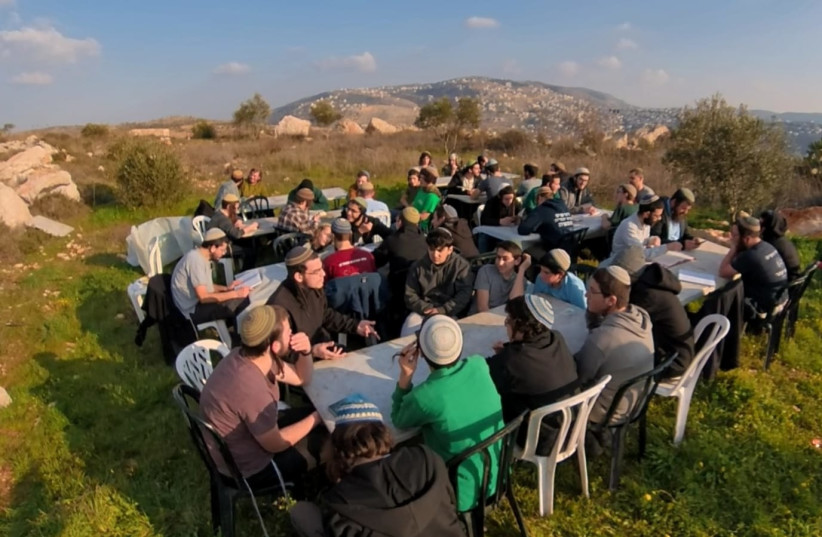Israel won’t engage in settlement activity that would harm the two-state solution, Foreign Minister Yair Lapid said as the state has advanced plans to authorize a yeshiva on the West Bank Evyatar hilltop over 26 km. beyond the pre-1967 lines.
“This government has made a policy of do no harm,” Lapid said in a response to a question about settlements posed to him during a joint press conference in Jerusalem on Thursday with his German counterpart Annalena Baerbock.
When it comes to the settlements, Lapid said, homes “will be built according to natural growth in the existing settlements.”
He added that “we are not going to build anything that will prevent the possibility of a future two-state solution.”
He spoke as Prime Minister Naftali Bennett’s government is under pressure from the Right and the settlement movement to uphold the Evyatar deal arranged on its behalf by the cabinet secretary and Defense Minister Benny Gantz (Blue and White).
The deal was arrived at in late June when the government was in its infancy, agreed to the authorization of both a yeshiva and a new community at Evyatar, in exchange for the voluntary evacuation of 50 families from that hilltop until the bureaucratic steps had been completed.

Lapid, along with the coalition’s Meretz party, have opposed the deal.
In the Knesset on Monday, Lapid said that the Evyatar “agreement was not made with me. I represent half of the government and therefore in my eyes it is not valid and I oppose it.”
But Gantz’s Blue and White party members, including Culture and Sports Minister Chili Tropper and Deputy Defense Minister Alon Schuster, have spoken clearly about the government’s intention to uphold its end of the bargain.
In the Knesset on Wednesday, Schuster said there that a yeshiva would be built at Evyatar, located off of Route 505 in the Samaria region.
“The Civil Administration conducted a land survey to examine the status of the land in the area. The survey found land that can be declared state land,” Schuster said in response to a formal query by MK Itamar Ben-Gvir (Religious Zionist Party).
Outgoing Attorney-General Avichai Mandelblit examined the situation, Schuster said. It was decided to consider the advancement of technical plans for the educational institution simultaneously within the 45-day objection period, he explained.
“There is an agreement and we intended to stand by our agreements,” Schuster said.
He added that of course security, political and diplomatic considerations would be taken into account.
Lapid and the Foreign Ministry have warned that the advancement of the Evyatar deal could harm Israel’s international standing.
The Palestinian Authority and the international community have rejected all settlement activity and called for a two-state solution within the pre-1967 lines.
At Thursday’s press conference, Baerbock said that Germany believed that settlement activity was “harmful” and “against international law.”
Former prime minister Ehud Olmert (Kadima) accepted the idea of two-states based on the pre-1967 lines.
When his successor Benjamin Netanyahu (Likud) spoke of two states, he insisted that he looked to include all the settlements within Israel’s final sovereign borders. Others in Israel who support a two-state solution have looked at an option that includes high-density population blocs and excludes isolated settlements in areas where Evyatar is located.
Bennett has opposed any creation of a Palestinian state.
Left-wing groups plan to hold a protest rally outside of Evyatar on Friday morning. Settlers and right-wing supporters have set up a protest encampment outside Evyatar this week as part of their push to ensure that a yeshiva is built there.
